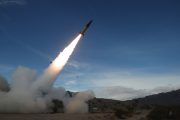
The future of the Middle East is uncertain, as Iraq moves forward toward a future without a U.S. presence.
The governments of Iraq and the United States jointly said on Thursday that they will soon initiate talks to iron out a withdrawal of American-led forces in the Middle Eastern country — a force maintained with the ostensible aim of combating the terrorist group known as the Islamic State (ISIS).
As The Associated Press notes, the word of talks comes as attacks by Iran-backed militias have increased in Iraq. Washington officials, however, say that plans for such talks were first brought up between the two governments last year and have nothing to do with the recent attacks.
Per American officials, members of the U.S. mission in Baghdad will meet with Iraqi delegates on Saturday to start the initial preparation for the discussions. Sabrina Singh, a spokeswoman for the Pentagon, asserted that Iraq has made no requests for American forces to withdraw.
ince the beginning of the Israel-Hamas conflict in October of last year, militants supported by Iran have targeted American military facilities in Iraq over 60 times and in Syria over 90 times, using a combination of drones, rockets, and missiles.
Kataib Hezbollah on Saturday carried out its most significant attack this year by launching multiple ballistic missiles at al-Asad Air Base, a major air base in western Iraq used by U.S. troops for training Iraqi security forces and coordinating anti-ISIS operations. In response, on Tuesday the U.S. targeted three identified locations of Iranian militias, resulting in casualties among the fighters. This action sparked protests by the Iraqi public demanding the withdrawal of U.S. forces.
AP further reported:
A U.S. defense official who spoke on condition of anonymity to provide additional details about the commission said the U.S. and Iraq have been discussing this for months and the “timing is not related to recent attacks.” The U.S. will maintain the “full right of self-defense” during the talks, he said.
Iraq’s foreign ministry said in a statement that Baghdad aims to “formulate a specific and clear timetable that specifies the duration of the presence of international coalition advisors in Iraq” and to “initiate the gradual and deliberate reduction of its advisors on Iraqi soil,” eventually leading to the end of the coalition mission and a “move to comprehensive bilateral political and economic relations with the coalition countries.”
The ministry said Iraq is committed to ensuring the “safety of the international coalition’s advisers during the negotiation period in all parts of the country” and to “maintaining stability and preventing escalation.”
A potential decrease in forces also would cast doubt on America’s ability to maintain its counter-ISIS operations in Syria without a troop presence in Iraq. The forward bases in Syria, housing approximately 900 U.S. troops, rely on airlift and logistical support from U.S. installations in Iraq. U.S. officials did not elaborate on how a reduction in Iraq might affect these operations.
There are approximately 2,500 American troops currently stationed in Iraq. While U.S. combat forces left the country in 2011, more were deployed three years later, in 2014, to assist Baghdad in its war against ISIS.
Militia attacks on U.S. bases in the region have resulted in over 70 U.S. personnel incurring minor injuries, including brain injuries. One U.S. service member has suffered serious injuries since the onset of militia attacks.
The U.S. has responded by targeting militia installations, including those associated with the Popular Mobilization Forces — a coalition primarily composed of Shiite, Iran-backed paramilitary groups. While officially under Iraqi military control, the coalition largely operates independently in practice. Iraqi officials have raised objections to the U.S. strikes, asserting that they infringe upon Iraq’s sovereignty.
During a speech at the World Economic Forum in Davos this month, Iraqi Prime Minister Mohammed Shia al-Sudani said there is no reason for the foreign coalition to remain in his country, contending that his nation’s own military capabilities are adequate to dismantle the remaining ISIS cells.
“We are a sovereign country, and therefore it is only natural that we moved towards this position,” said al-Sudani. “This is a request from the people, and this is a democratic country.”
An official from the Iraqi government stated that Baghdad forwarded a written request to the White House in November seeking the removal of coalition forces. The official noted a disagreement between Iraqi and U.S. officials regarding the time frame. While U.S. officials suggested a two- to five-year timeline, Iraqis advocated for a shorter withdrawal schedule.
It is anticipated that if the United States carries out a withdrawal, American troops would remain in the northern, semi-autonomous Kurdish region, which has a government with friendlier ties to the U.S.
Are these recent developments a sign that the days of America’s drawn-out adventurism in the Middle East are coming to a close, as Middle Eastern partners find themselves more emboldened to say “no” to Washington?




